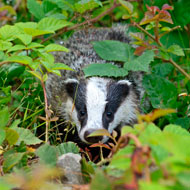
Just under 1,000 badgers to be culled in second phase of pilots
It has been confirmed that the second year of badger culling has begun again in parts of Gloucestershire and Somerset.
Meurig Raymond, president of the National Farmers' Union has written to members confirming the start of the culls.
He said: "Travelling round the country I’ve seen first-hand the total human misery [bovine TB] causes for farmers and their businesses. I’ve sat round farm kitchen tables with families who have been driven to despair after investing time and money building up their herds, only to see them devastated by bTB."
Badger culling is part of the Government's strategy to achieve bovine TB free status for England, but the policy remains controversial with many wildlife and animal welfare groups, who say the culls are inhumane and ineffective.
Mark Jones, executive director of the Humane Society, said: "I am appalled and saddened that this cruel and pointless waste of badgers’ lives is taking place once more in England."
Last year's pilot culls in Somerset and Gloucestershire were heavily criticised for failing to reach targets. Licensees were granted extensions on the initial six-week cull period, but still failed to remove the target 70 per cent of badgers from the population.
Further, the independent expert panel responsible for monitoring the culls reported that they failed on both humaneness and effectiveness.
This year's culls will be monitored by Natural England, the body responsible for issuing licenses for the culls. Recently, the Badger Trust questioned the legality of culling without independent monitoring, but the challenge was rejected by the Administrative Court.
Earlier this month, Defra launched the badger edge vaccination scheme, which offers government support to schemes being carried out on the edge of the bovine TB high risk areas.
The move was welcomed by the BVA, who announced their support for the continuation of the culls in July this year. BVA president Robin Hargreave says culling is a “necessary part of a comprehensive bovine TB eradication strategy that also includes strict cattle measures and vaccination.”



 The Veterinary Medicines Directorate (VMD) is inviting applications from veterinary students to attend a one-week extramural studies (EMS) placement in July 2026.
The Veterinary Medicines Directorate (VMD) is inviting applications from veterinary students to attend a one-week extramural studies (EMS) placement in July 2026.